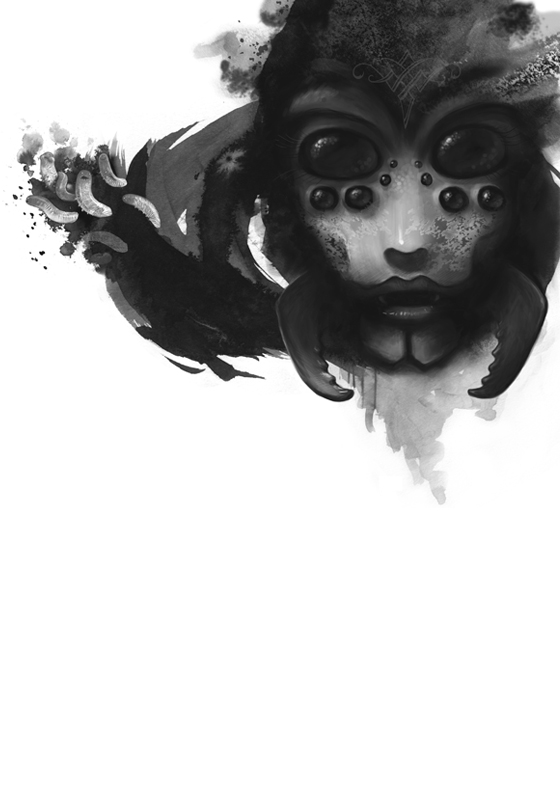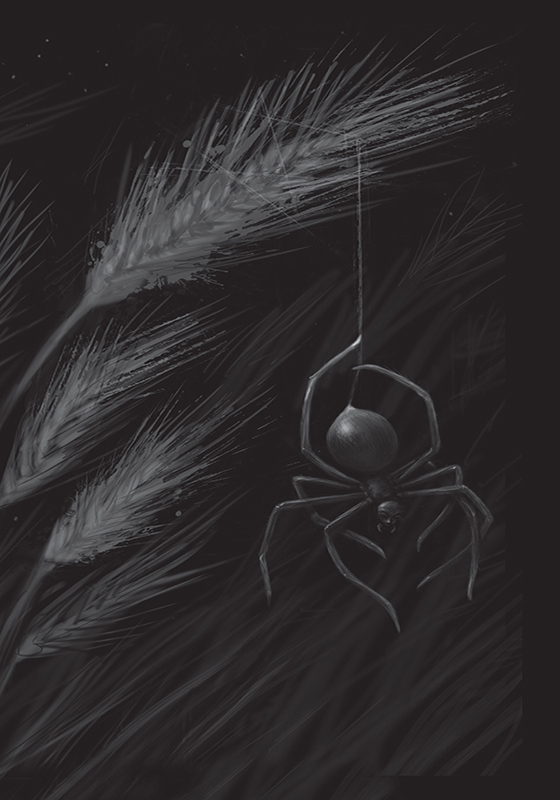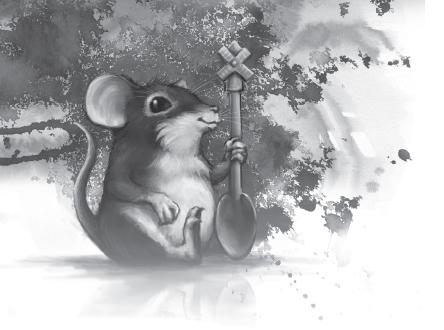Fat & Bones (5 page)
Authors: Larissa Theule
Â
“Unbelievable!” shouted Fat, turning back to Leonard. “You spiders sure stick together, don't you? One spouts god-awful poetry while the other breaks free.”
Leonard was pleased beyond measure by the turns of events. He smiled uncontrollably.
Fat moved quickly, brandishing the knife. “You owe me blood, arachnid.” He drove the blade deep into Leonard's front right leg.
Leonard staggered back from pain, crumpling to the floor.
Fat fetched a beaker and set it beneath the wound, patting down Leonard's leg hairs so they wouldn't disrupt the flow.
“Very good,” Fat murmured after some time. “A most excellent burgundy. Really excellent. And not a bad consistency, either.”
Leonard began to feel lightheaded. “Excellent.”
“That's what I said,” said Fat.
“Excellent.”
“Stop repeating what I say.”
“Stop repeating what I say,” said Leonard. He had forgotten where he was.
Fat raised the knife. “Do you want me to give that wound a twin?”
“Excellent.”
Fat peered across Leonard's eight eyes. “Hmm,” he said, “I might have drawn too much.” He shrugged.
Higher in the tree, several limbs above, the kettle shrieked inside Leonard's hole.
“My kettle,” whispered Leonard.
Fat kicked aside the broken sunglasses on his way to his worktable. He poured Leonard's blood into the Bluebell Blindness Inducer potion and swirled the mixture.
The kettle's scream cut through the night.
“Where can a fellow go for a little peace and quiet?” Fat shouted, banging the potion on the table.
“Kettle,” whispered Leonard.
After fanning his wings and stomping his feet, Fat realized that if he did not want the tree to burn down, he'd have to take the kettle off the fire himself. He glared at Leonard, slumped in the corner. The spider had ruined the evening.
And yet â¦
The spider was also his neighbor. Did rules about helping a neighbor in need still apply in this day and age? Fat sighed and threw the knife onto the worktable.
“I am ever one for sacrifices,” he said and pulled out a clean white cloth from the cupboard. He fluttered over to Leonard and placed the cloth upon the spider's wounded leg, staunching the flow.
“You sit tight,” said Fat, straightening Leonard's stocking cap. “I will return shortly.”
While Fat flew out to tend to the kettle, Leonard slowly regained consciousness. He could hardly move his legs, but his eyes cleared a little. By the time Fat returned, kettle in hand, Leonard had dragged himself to the middle of the room and propped himself against a chair.
“You're recovering well,” Fat said. “That's quite a constitution you have.” He held up the kettle. “I saved the tree from burning. Shall we share a cup to celebrate? I think I have an herbal variety around here somewhere.”
Leonard did not want tea. He did not want to stay and chat.
However, being unable to move, he had no choice but to curl a leg around the teacup Fat set on the floor.

Tea made Fat convivial. “Tell me, neighbor, how did you come by your love of poetry? You see, when I was young, I kept a journal of verse. I was no master of the form, you understand, but I came up with one or two pretty turns of phrase.”
Fat droned on. To hear the fairy talk, a listener would think he had been the one starved for conversation.
But Leonard didn't hear or care. Weak though he was, he smiled.
Before Priscilla Mae had slipped into the night, she had whispered to him, “Find me under the eaves. Poetry moves me.”
A single whiff of love had swept Leonard free of gloom.
“What a day, eh, neighbor?” said Fat. He looked around his hole with a satisfied grin. “Incidentally, how did that other spider escape?” He chuckled. “Now she was a sneaky one.”

In the deep, dark night, unpopular but necessary creatures emerge from their hiding places and undertake unpopular but necessary activities. When dawn shoves the night away, no one speaks of these things, including me. But dawn has not arrived.

Priscilla Mae crept back into the night, away from the fat fairy's tree.
From a distance, she heard singing.
She paused, dangling in the cool night air.
A thousand voices rose, as clear as the stars above.
Priscilla Mae listened carefully, eagerly, to discern the words of the song.

Dead man, dead man, once a beast,
Now a splendid midnight feast,
Newly dead, your blood still fresh,
Best of all's the softest flesh,
Dead man, dead man, once a beast,
Now a splendid midnight feast.
Maggotsâshe should have known. Not a pretty sight, seeing maggots do their work, but they did their job awfully well. And anyway, it wasn't as if that old farmer deserved better. He really had been a beast.
Famished, Priscilla Mae carried on her way, the song stuck in her head.
Mrs. Bald lies on the floor weeping. Her heart is breaking. My own pain is salved somewhat by the happy plan of revenge inside my brain. But it's not quite time for revengeâit's time for love. Not to worry, this is not a love story with singing cherubs and heart-shaped chocolates. This is a love story with a wicked turn.

Alice. Oh, Alice.
From dawn until dusk, Jimmy thought of her. At night, he dreamt of her. His head, his heart, filled with the abiding love of which poets write.
That is a whole lot of love for so small a mouse.
Alice, meanwhile, was the biggest mouse on the farm.
Not that Jimmy cared a whit whether Alice was as large as an orange or as small as a walnut. He loved her, and that was that.
When his father said, “Still pining after that Alice, Jimmy, my boy?” Jimmy would say, “You betcha.”

When his brothers teased him and said, “You gonna marry that big mouse and let her boss you around?” Jimmy would say, “You betcha.”
When his mother said, “Jimmy, are you going to actually talk to Alice one day?” Jimmy would say, “You betcha.”
But one major obstacle had prevented Jimmy from talking to Alice. He dreamt and loved from a distance, for an ocean of kitchen floor lay between them. And that floor was ruled by the very large, very unpredictable cat.
On some occasions, the cat would permit the house's mice to travel across the floor unbothered. He was even rumored to have once said pleasantly, “Good afternoon, mousie-pie.” On other occasions, he would rest on his side, tail flipping nonchalantly, then spring up and crush a mouse between his teeth.
A mouse never knew what to expect from the cat. Not even Jimmy wanted to risk such fickleness, even to speak with his beloved Alice.
One day, however, Jimmy overheard Smitty talking to Buster.
“Alice,” said Smitty.
“Lordy, you aim high,” said Buster.
“She's the one for me,” said Smitty.
“When will you ask her?”
“Tonight.”
“The cat?”
“I'm not afraid.”
Jimmy did not need to hear any more of the conversation. Smitty was a handsome mouse, arguably the handsomest on the farm. A fire started in Jimmy's heart. It traveled up into his head and down to the tip of his tail. He knew he could waste no more time.
At dusk, after finishing his chores, Jimmy made plans to cross the kitchen floor. If he lost his life in the pursuit of Alice, then so be it. Many mice had perished for less noble a cause than love.
“Don't do anything stupid, dear,” said Jimmy's mother.
“Give that Alice the kiss of her life,” said Jimmy's brothers.
“Come back in one piece, now, you hear?” said Jimmy's father.
“You betcha,” said Jimmy.
Leaving behind his family's cautions, Jimmy stepped out into the darkness and stood against the baseboard of the second-floor hallway, straining to see out over the kitchen. He took note of every small movement. His ears stood straight out, picking up every sound.
The farmhouse seemed quieter than usual.
Night had fallen fast.
To Jimmy's right, stairs led down to the kitchen. He scurried to them and jumped from one to the next, stopping to listen for some sign of danger.